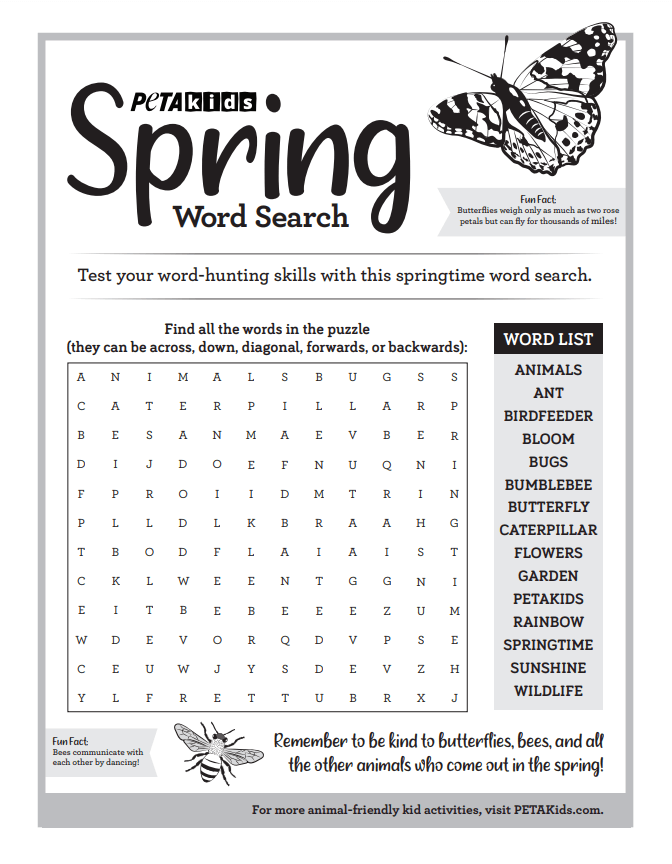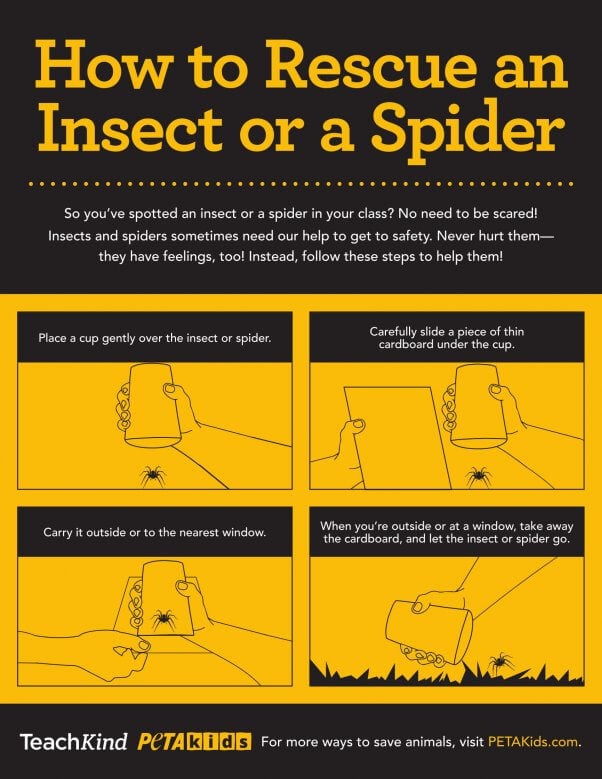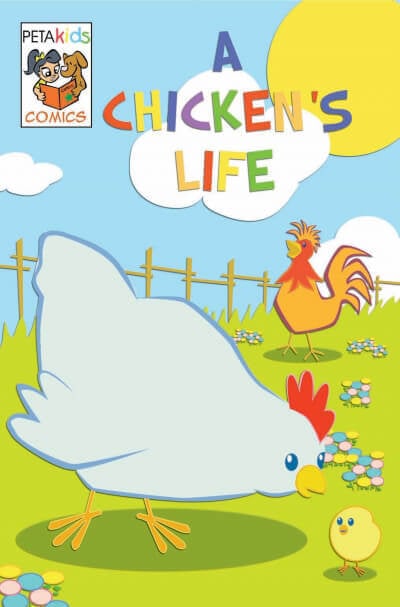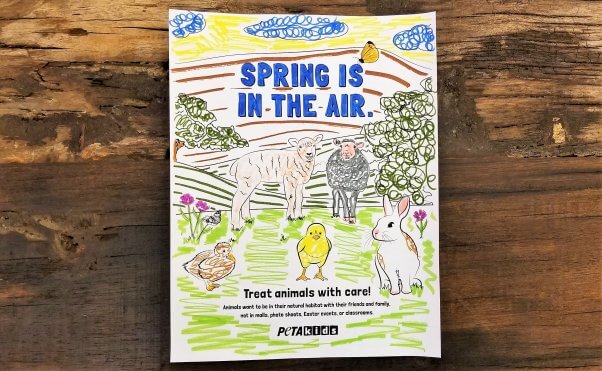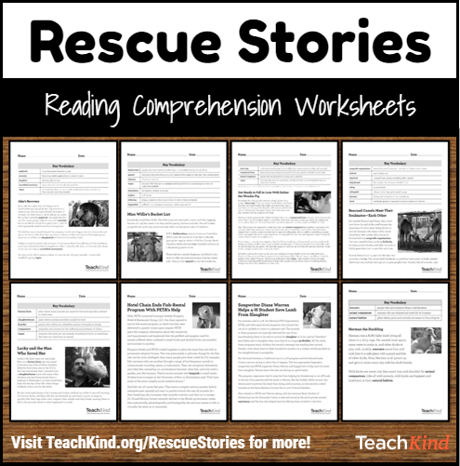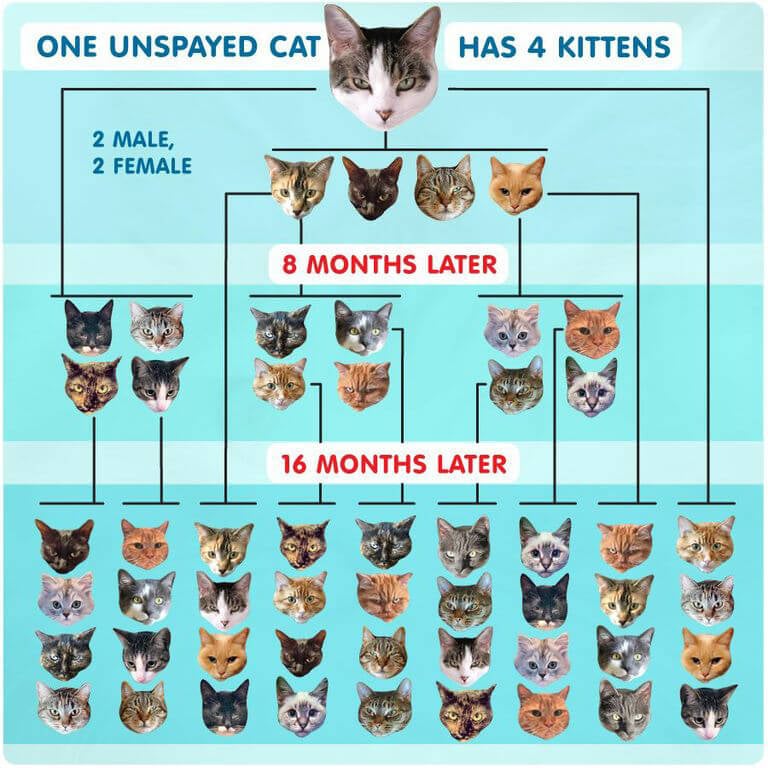Plant Seeds of Kindness in Your Students This Spring
Ahhh, spring is in the air. The skies are clearing, the trees are budding, and summer vacation is finally within reach—well, almost, anyway! Celebrate the inspiring change of season with your class using any (or all) of the following fun, festive, cruelty-free activities that will help foster kindness to animals all year long:

April showers bring May flowers—and with those flowers come a few bugs, of course. Teach your students to respect all animals, including insects, by printing out copies of PETA Kids’ spring-themed word search for your class.
Directions for Completing Online
To pull the page into Paint, just follow these steps:
- Save the file in Documents.
- Find the file in Documents, then right-click on it and open it in Word.
- Copy the image. (When you click on the screen, it automatically selects the entire image, so just press Ctrl+C.)
- Open Paint, then paste in the image. (Click anywhere on the screen and press Ctrl+V.)
While you’re at it, use TeachKind’s Insect Rescue Poster to demonstrate to students, step by step, the safe and humane way to catch and release insects who have made their way indoors. Check out these inspiring high school students whose teacher assigned them to rescue insects as part of a lesson on ecosystems in their environmental science class.
Every spring, when lessons on the topic of life cycles are popular, well-meaning educators may order life-cycle kits that use live animals, such as butterflies or frogs, without realizing that they suffer in these projects. Ditch these cruel kits—some of which recommend freezing the animals after the project is complete—and use TeachKind-approved humane life-cycle materials instead. Make sure that your school also says no to cruel chick-hatching projects and instead teaches kids about the life cycle using a humane alternative, such as The Exploratorium’s Traits of Life: Making More Life web feature or Learning Resources’ Chick Life Cycle Exploration Set.
Speaking of chickens, teach your elementary school students how individual, interesting, and intelligent these animals are by using TeachKind’s “A Chicken’s Life” activity. The lesson includes a free kid-friendly comic as well as corresponding printable worksheets that will help your class appreciate chickens and understand that neither they nor their eggs should be thought of as Easter props. For older elementary students, you can also use these inference task cards and main idea task cards to help students practice their reading comprehension skills while developing empathy for chickens.
If you work with middle or high school students, teach them more about the lives of chickens exploited for their eggs with the lesson Where Do Eggs Come From? Then, put things in perspective by having them pull out a standard piece of notebook paper and asking them to imagine that they are a chicken forced to live in a space the size of that sheet of paper for their entire life. Explain that this is reality for millions of birds who are crammed into small cages on today’s farms and used to lay eggs—including Easter eggs.
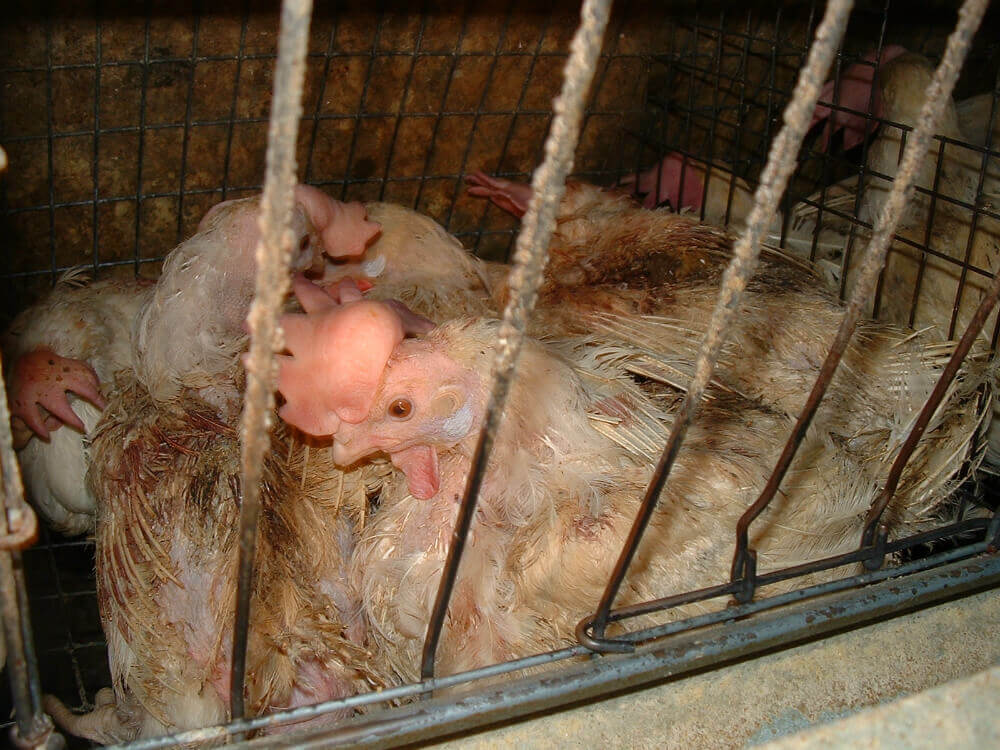
We often see adorable baby animals out and about in the spring—but it’s important to remember that animals such as chicks and rabbits aren’t toys or teaching tools and to instill this understanding and respect in our students. After students have decorated this coloring sheet, hang up their creations as a reminder that animals belong in their natural habitat with their friends and family and that taking them away from their home is cruel.
Inspire students to be on the lookout for animals in their neighborhood who need help and empower them to be heroes to animals with TeachKind Rescue Stories reading comprehension worksheets. These stories are perfect for spring:
- Pickles the Rabbit (for grades K–2)
- Florence the Cat Survives a Flood (for grades K–2)
- Herman the Duckling’s First Swim (for grades K–2)—includes a video
- Lucky [the Chicken] and the Good Samaritan Who Saved Her (for grades 6–8)—includes a video
- Songwriter and Student Save Lamb From Slaughter (for grades 9–12)
- Teens Save a Suffering Squirrel (for grades 9–12)
If you have gardening space available, now is the perfect time to grow some native plants and help children create and tend an animal-friendly garden where they can observe local wildlife. A great resource for purchasing seeds for plants native to your area is Prairie Moon Nursery, which takes away the guesswork by providing information about regional suitability and the necessary conditions for growing each type of seeds available. You could also talk to children about the positive impact that native plants can have on wildlife in your area.
How about a little spring cleaning? Take the opportunity to teach your students, in an age-appropriate way, about the use of animals in painful experiments to test household cleaning products and other substances. Then explain how they can identify cruelty-free products. (This lesson is great for elementary students, and this one is for middle or high school students.) You can refer to this list when you need to do a little cleaning of your own!

As surely as spring brings daffodils and tulips, it also brings kittens—lots of them. Animal shelters everywhere brace themselves for what they call “kitten season.” Pregnant cats and litters of homeless kittens come pouring in, and facilities scramble to accommodate them all. Kittens may be cute, but the consequences of the homeless-animal crisis are anything but. Use this free lesson plan to teach your students about this issue and ways they can help companion animals.
*****
Need more animal-friendly inspiration for your classroom? Join TeachKind’s mailing list!
By submitting this form, you’re acknowledging that you have read and agree to our privacy policy and agree to receive e-mails from us.

